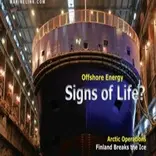China, Russia to build ‘Ice Silk Road’ along Northern Sea Route

China and Russia have reportedly agreed to jointly build an ‘Ice Silk Road’ along the Northern Sea Route in the Arctic.
Chinese President Xi Jinping met with Russian Prime Minister Dmitry Medvedev in Moscow to discuss further bilateral cooperation, according to Xinhua.
Xi said Russia is an important partner in the construction of the Belt and Road initiative – referring to Beijing’s new Silk Road project – and urged the two countries to “carry out the Northern Sea Route cooperation so as to realise an ‘Ice Silk Road’, and to implement various connectivity projects”.
The Xinhua report did not give further details about the cooperation along the Northern Sea Route, which is a shipping lane running between the Pacific Ocean and the Atlantic Ocean along Russia’s northern coast.
The announcement however comes shortly after China formally included the Arctic Sea to its Belt and Road initiative, which seeks to boost trade through massive investments in railroads, ports and other infrastructure linking Asia to Europe and Africa.
China’s National Development and Research Commission and State Oceanic Administration said in a document published on June 20 that a “blue economic passage” is “envisioned leading up to Europe via the Arctic Ocean”.
The other two passages run through the South China Sea and the Indian Ocean to the Mediterranean and through the South China Sea to the Pacific.
The document said China hopes to work with all parties to conduct research of navigational routes as well as climatic and environmental changes in the Arctic, and to explore the region’s potential resources.
It also encouraged Chinese companies to take part in the commercial use of the Arctic route and stated that China will actively participate in the events organised by Arctic-related international organisations.
China-Russia cooperation in the Arctic
Xi’s visit to Russia follows Beijing’s increased diplomacy in recent months with Arctic countries, including Norway, Finland, Denmark and Iceland.
Although China is not a littoral Arctic state, it has shown interest in exploring and developing the region, which is estimated to hold 13 percent of the worlds undiscovered oil resources and a third of its undiscovered natural gas resources.
As ice melts due to global warming, these resources as well as shipping routes in the Arctic are expected to become easier to exploit and use.
In 2013, China secured a permanent observer status in the Arctic Council, where Canada, Denmark, Finland, Iceland, Norway, Russia, Sweden and the United States discuss and decide on sustainable development and environmental protection in the region.
Professor Wang Yiwei from Renmin University in Beijing told gbtimes in a recent interview that China may need to cooperate more with Russia in order to have its say in the formulation of rules and standards in the Arctic.
For its part, Russia has promoted the Northern Sea Route as an alternative route that would help cut shipping times from Shanghai to Rotterdam by about a week compared to sailing through the Strait of Malacca and the Suez Canal.
Chinese state-owned shipping company Cosco was the first in the world to send a container ship through the Northern Sea Route in 2013. It sent a record five ships through the route in 2016, contributing to a total of 19 vessels that made the full route that year.
China and Russia are also cooperating in a liquefied gas project in the Yamal Peninsula, which lies along the Northern Sea Route and has boosted cargo traffic on the shipping lane.
The US$27bn project has received US$12bn in loans from China’s Export-Import Bank and China Development Bank while the Silk Road Fund, set up by Beijing to fund projects under the Belt and Road initiative, has a 9.9 percent share in the project.
However, the legal status of the Northern Sea Route – which Russia’s maintains is part of its internal waters – as well as Russia’s cautiousness about China’s increased role in the Arctic may hinder further cooperation between the countries.















![AIRBUS A380 [MORE THAN 600 PASSENGER’S CAPACITY PLANE]](https://cdn.tinn.ir/thumbnail/4jCp4EQvCU0b/IjHVrSYQrIAqIzXuTzADR7qLYX4idQT4nfq__26E5SCUPLMqfhWkWajvuO9Wfq1ql1TjV4dhkrHliNQU82kMpo2NNftT_NGEwHc9KXtN_rk731bmifa2IQ,,/airbus-a380-structure1.jpg)

Send Comment